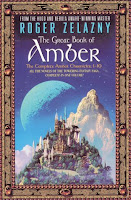Zelazny will always have a special place in my collection as one of the best fantasy and science fiction writers I've ever read. So here's a list of books if you want to get started with him.
The Chronicles of Amber, a cycle of ten novels and once you become a devout fan you'll want to read the short stories too.
When it comes to multiverses, first names that come to my mind are Zelazny's Amber, Moorcock's multiverse, Stephen King's Dark Tower and Gaiman's Sandman (though the latter shares its multiverse with the rest of DC comics).
Zelazny's multiverse is special: two "real worlds" - Amber and the Courts of Chaos, both drop shadows (Amber castle's reflection in water and in the night sky are separate worlds and relatively easy to visit). They manifest Order (the Pattern and the Unicorn) and Chaos (the Logrus and the Serpent). The rest is shadows of these two, and those of royal blood walk the shadows through their eternal conflict.
Creatures of Light and Darkness, another example of how Zelazny blends science fiction and ancient mythology. Egyptian, this time. And once more - a multiverse, tempural fugue (a martial technique used by some very powerful characters when combatants project themselves multiple times in time and space - infinite times, depending on their mastery).
The narrative of "Creatures of Light and Darkness" is a bit specific; just don't let it scare you off in the beginning and soon you'll get a taste for it.
And, of course, the Agnostic's Prayer:
Insofar as I may be heard by anything, which may or may not care what I say, I ask, if it matters, that you be forgiven for anything you may have done or failed to do which requires forgiveness. Conversely, if not forgiveness but something else may be required to ensure any possible benefit for which you may be eligible after the destruction of your body, I ask that this, whatever it may be, be granted or withheld, as the case may be, in such a manner as to insure your receiving said benefit. I ask this in my capacity as your elected intermediary between yourself and that which may not be yourself, but which may have an interest in the matter of your receiving as much as it is possible for you to receive of this thing, and which may in some way be influenced by this ceremony. Amen.
The Lord of Light, another example of how Zelazny blends mythology with science fiction.
His followers called him Mahasamatman and said he was a god. He preferred to drop the Maha- and the -atman, however, and called himself Sam. He never claimed to be a god, but then he never claimed not to be a god.
Basically he could manipulate energy in every form.
Those reached technological perfection have claimed themselves thrones of Hindu gods, while their offsprings live mortal lives. Two ideas - Theocrates and Accelerists - clash on whether humans should be left to develop technology on their own or be helped. And Sam is, of course, one of the rebels.
Written in the form of a series of short stories rather than a novel, it follows the life of Mahasamatma, who has chosen to take the image of Buddha, on his quest to enlighten and free humanity from the dominion of oppressive man-gods.
Jack of Shadows, where the world doesn't revolve around its axis but is fixed, so the day rules one half of it, with science and technology, and night - the other side, dominated by magic and monsters. And a cursed god in the middle, who shall be free once he sees the dawn.
The lords of the night side all have their places of power; to Jack, who was born on the borderline of day and night, his place of power is anywhere shadows are.
You might find this novel a bit overstretched, yet if you're careful you'll notice that's the way it should be. And first of all - it is a journey, to the end of all things.









.jpg)
.jpg)
.jpg)


.jpg)